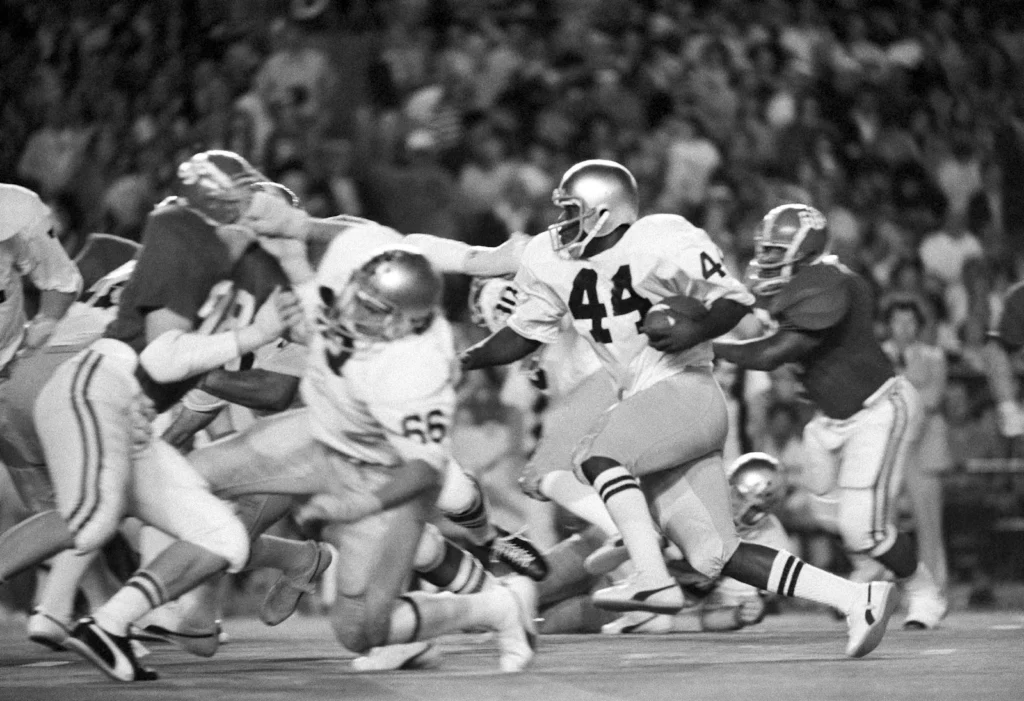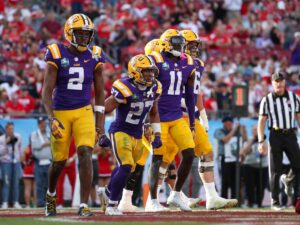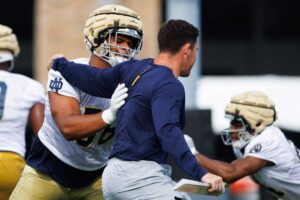
Eric Penick, Star of Pivotal 1973 Notre Dame Championship Moment, Dies at 71
Eric Penick, the dynamic and powerful running back who helped vault Notre Dame to a national championship with a game-defining play in 1973, has died at age 71. His death marks the passing of not only a beloved figure in Fighting Irish lore but also a trailblazing athlete whose contributions extended far beyond a single historic run.
Born and raised in Cincinnati, Ohio, Penick came to Notre Dame in the early 1970s at a time when the program was a storied institution seeking its next great chapter. He arrived as a versatile and determined athlete, blessed with a rare combination of speed, strength, and intelligence. But Penick was more than just a talented running back—he was a player whose will to win and grace under pressure would forever etch his name into Notre Dame football history.
Penick’s place in Fighting Irish legend was cemented on a cool November afternoon in 1973, when the undefeated Irish clashed with their archrival, the University of Southern California, in South Bend. It was a game that loomed large for Notre Dame, not just as a showdown between two college football powers, but as a necessary stepping stone to national title aspirations. With the game still in its early stages and the momentum hanging in the balance, Penick took a handoff and sprinted 85 yards down the sideline, outrunning defenders, igniting the crowd, and sending a message to the nation. It was a seismic play in a 23–14 Notre Dame victory, one that snapped USC’s 23-game unbeaten streak and helped catapult the Irish to No. 1 in the country.
That run wasn’t just a highlight reel moment—it was a symbolic turning point. Notre Dame had struggled mightily against USC in previous seasons, losing by blowout margins, and there was real pressure on Ara Parseghian’s team to finally break through. Penick’s gallop, which has been replayed countless times in South Bend and beyond, embodied everything that team stood for: toughness, unity, and the power of belief.
Though he would finish the 1973 season with a solid 586 rushing yards and six touchdowns, it was Penick’s timing—his ability to rise when the team needed him most—that defined his college career. Notre Dame would go on to finish that year with an unblemished 11–0 record, culminating in a Sugar Bowl win over No. 1 Alabama. It was the school’s first consensus national title under Parseghian, and Penick’s 85-yard statement remained one of the season’s signature moments.
Eric Penick’s story, however, was never limited to a single play or a single season. He represented a growing wave of Black athletes at Notre Dame during a time of cultural transformation in college football. In 1973, the Irish had just begun to shed some of their long-standing racial barriers, and Penick, along with teammates like Clarence Ellis and Wayne Bullock, helped lead the charge. He handled the spotlight—and the societal pressure that came with it—with poise, giving younger players someone to look up to both on and off the field.
In interviews long after his playing days ended, Penick often spoke with humility about that 1973 season. He didn’t view himself as a hero but rather as a cog in a greater machine. He credited his offensive line—especially center Dave Casper and guards Gerry DiNardo and Steve Neece—for opening up the lane that allowed his legendary run. “All I had to do was run,” Penick once said with a laugh, downplaying his own brilliance. “Those guys made it happen up front.”
After graduating from Notre Dame, Penick was selected by the New Orleans Saints in the 1974 NFL Draft. He spent a brief time in the league before injuries and life’s shifting priorities redirected his focus. He returned to Cincinnati, where he became a dedicated community leader, mentor, and advocate for youth development. For decades, Penick worked in local schools and nonprofit organizations, mentoring countless young athletes and emphasizing education, discipline, and character.
To those who knew him best, Penick was a man of deep faith, humor, and generosity. He carried himself with quiet confidence, never seeking attention, and never resting on past accolades. At reunions and speaking engagements, Penick was always willing to recount his glory days at Notre Dame, but he was even more interested in hearing others’ stories, asking how their families were doing, and sharing laughter over the passage of time.
His teammates remembered him as a rock in the locker room—serious when needed, but always quick with a joke or encouraging word. Former quarterback Tom Clements, who helped lead the ’73 team with calm leadership, once called Penick “one of the toughest guys I ever played with, and one of the kindest I’ve ever known.”
As the news of his passing spread throughout the Notre Dame community, tributes poured in from alumni, coaches, and fans alike. The University released a statement honoring Penick as “a champion in every sense of the word—on the field, in the classroom, and throughout his life.” Notre Dame head coach Marcus Freeman, himself a Cincinnati native and part of the next generation of Black leaders at the program, acknowledged Penick as “a trailblazer who opened doors and showed what Notre Dame football could be.”
At Notre Dame Stadium, where Penick’s run still echoes through time, the university plans to honor his legacy with a video tribute during the upcoming season. It’s a fitting gesture for a player whose moment of brilliance helped rewrite the program’s trajectory and whose impact resonated well beyond the scoreboard.
In recent years, Penick had faced several health challenges, but he remained in touch with many from the Notre Dame family. In 2023, he was honored during the 50th anniversary celebration of the 1973 championship team, receiving a thunderous ovation from the Fighting Irish faithful. Those in attendance said it was a moving sight to see the crowd rise in unison for the man whose 85-yard run once brought them all to their feet.
Eric Penick’s story reminds us that greatness in sports isn’t just about talent or statistics—it’s about seizing moments, lifting up others, and carrying oneself with grace long after the final whistle. He was a man who wore the blue and gold with pride, who lived by the values of discipline and faith instilled during his years under Parseghian, and who never forgot where he came from.
He is survived by his wife, children, and grandchildren, who remember him not only as a football icon, but as a loving husband, devoted father, and a man who inspired with quiet strength.
Though the years may pass and new legends may rise, the image of Eric Penick sprinting down the sideline, cleats barely grazing the turf, eyes locked on the end zone, remains frozen in time. It was a moment that gave a team belief, lifted a university’s spirit, and helped deliver a championship. It was the run of a lifetime—and the mark of a life well lived.
Eric Penick, forever remembered in Notre Dame hearts, was 71.





